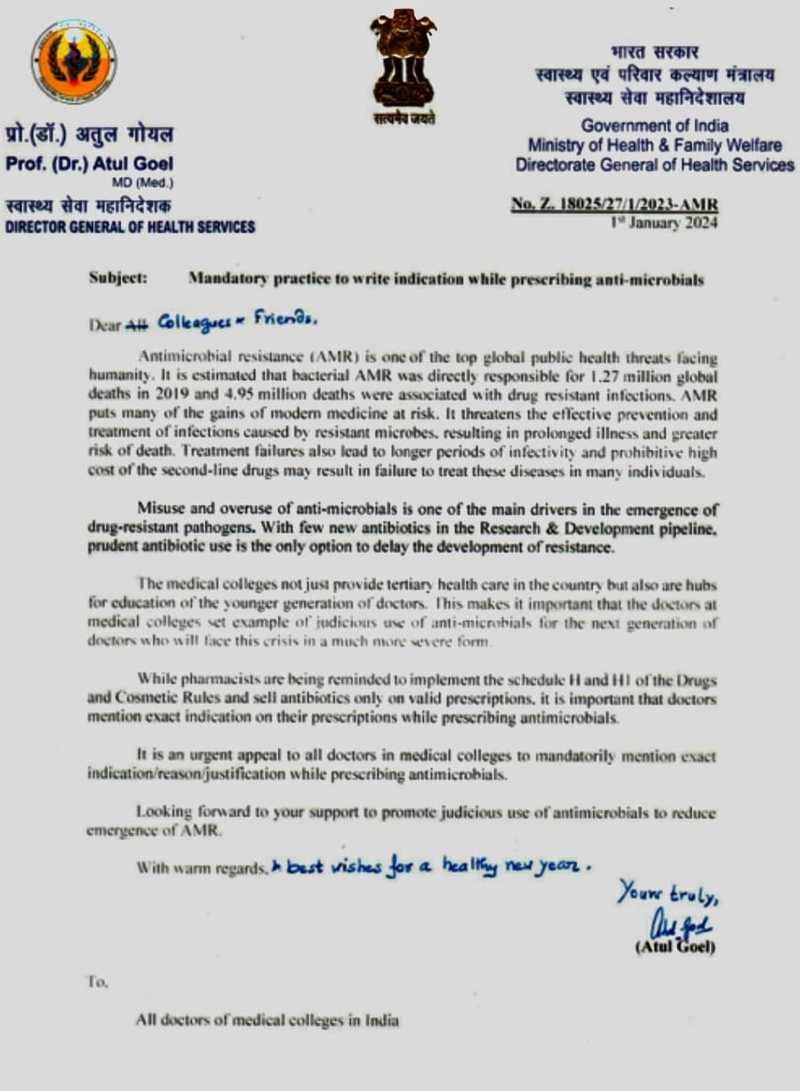Prescribing Antibiotics: What is the New Mandate?
M3 India Newsdesk Feb 18, 2024
The article highlights the Union Health Ministry's call for precise antibiotic prescriptions to address the increasing threat of antimicrobial resistance, citing alarming statistics on the widespread misuse of antibiotics in India.
The Union Health Ministry has asked physicians to note the precise reason for each antibiotic prescription they write down since antimicrobial resistance is on the increase. Simultaneously, pharmacists have been advised by law to refrain from dispensing these medications without a legitimate prescription.
Antimicrobial resistance (AMR) is a hidden epidemic that may cause over one crore deaths worldwide by the end of 2050, according to the WHO.
According to the advice, drug-resistant infections were linked to 4.95 million fatalities worldwide in 2019 and 1.27 million deaths worldwide were directly caused by bacterial AMR, putting the advancements in modern medicine in jeopardy.
It jeopardises the ability to effectively prevent and cure infections brought on by resistant bacteria, increasing the likelihood of a protracted illness and even death. Longer durations of infectivity are another consequence of treatment failures, and many people may not be able to get these medications due to their prohibitively expensive cost," the statement said.
"It is important that doctors mention the exact indication on their prescriptions while prescribing antimicrobials," writes the Union Director General of Health Services in a letter earlier this month to the organisation of doctors.
We urgently need all medical college physicians to make sure that they always provide a precise indication, rationale, or explanation when writing an antibiotic prescription.
- The letter asked medical schools to lead by example in the prudent use of antibiotics for the next medical workforce.
- The letter restated the Drugs and Cosmetics Act's requirements that antimicrobials must be sold with a prescription from a licenced medical professional and was also sent to the Association of Chemists.
- Under Schedule H and H1 of the Drugs and Cosmetics Act, antimicrobials are classified as medications that need a prescription to be marketed.
- Third- and fourth-generation antibiotics are included in the Schedule H1 medications, the records of which must be kept on file for three years.
One of the key factors contributing to the emergence of drug-resistant bacteria is the improper and excessive use of antibiotics. Since there aren't many new antibiotics being developed right now, the only way to stop the emergence of resistance is to use antibiotics responsibly.
In anticipation of your assistance in promoting the prudent use of antibiotics to prevent the evolution of resistance, the contents of both letters stated.

Alarming statistics
The National Centre for Disease Control (NCDC) released the letters against the startling conclusion that 57% of antibiotic prescriptions in India are those that have the potential to cause high antimicrobial resistance.
The survey was the first multicentric point prevalence survey of antibiotic use at 20 hospitals in India.
According to the report, 71.9 per cent of patients used antibiotics, a "remarkably high prevalence"; 4.6 per cent of patients used four or more medications.
Antimicrobial resistance was identified by the World Health Organisation (WHO) as one of the top 10 dangers to public health in 2019.
According to the NCDC study, the usage of antibiotics has grown less effective for a variety of reasons, with one major contributing factor being their "indiscriminate, excessive, and inappropriate" use.
It is alarming to see such a high rate of antibiotic prophylaxis. Many doctors provide antibiotics to patients with viral infections in an attempt to avoid a supra-added bacterial infection, even though this is not advised. Furthermore, almost all surgeons give antibiotics for up to 15 days. This is a result of their extreme fear of their patients being infected, even though this should be prevented.
Antibiotics are among the medications listed under Schedule H of the Drugs & Cosmetics Rules 1945, which state that they may only be sold at retail with a registered medical practitioner's (RMP's) prescription.
Disclaimer- The views and opinions expressed in this article are those of the author and do not necessarily reflect the official policy or position of M3 India.
About the author of this article: Dr Monish Raut is a practising super specialist from New Delhi.
-
Exclusive Write-ups & Webinars by KOLs
-
Daily Quiz by specialty
-
Paid Market Research Surveys
-
Case discussions, News & Journals' summaries